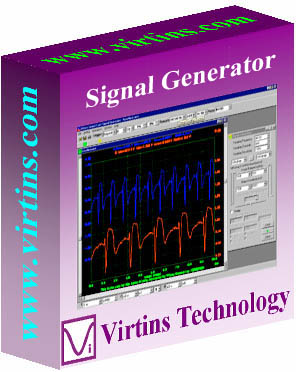
Specifications
1. DAC Hardware Related Specifications
Sound Card Based Systems:
1) Bandwidth: 1 Hz - 200 kHz
(sound card dependent).
2) Maximum Output Voltage: about 2 V
(sound card dependent).
3) Selectable sampling frequency (up to
768 kHz), sampling bit resolution (8, 16, 24 or 32 bits) and sampling
channels (one or two) (sound card dependent).
4) Support
calibration of the output channels.
Non
Sound Card Based Systems:
Please refer to the respective
hardware manual.
2. Support predefined waveforms: Sine,
Rectangle, Triangle and Saw Tooth. The duty cycle for a rectangle wave
is adjustable.
3. Support non-repetitive pink noise and white
noise generation. It is possible to generate identical or
different noises across channels.
4. Support multi-tones generation. A
Multi-Tones is a combination of predefined waveforms with different
amplitudes, frequencies, and phases. Pink noise and white noise with
specified amplitude can also be added into the multi-tones. Maximum 200
tones can be combined in each channel. In addition to the manual
configuration method, automatic configuration method is provided to
generate multitones that are aligned to FFT bands or fractional octave
bands within a specified frequency range. When the multitones are
aligned to FFT bands, it is possible to specify the signal's frequency
response: white noise (flat), pink noise (1/f) or arbitrary (a frequency
response file *.frf).
5. Support arbitrary
waveform generation through user defined waveform library. A waveform
library is a TXT file containing the coordinates of each point in one
cycle of the waveform. There is no limit as to how many points can be
used to define a waveform. Two types of libraries are supported:
Waveform Library and Bit Perfect Library.
6. Support Maximum Length Sequence
(MLS) generation. The length can be selected from 127 to 16777215.
7. Support Dual Tone Multi-Frequency (DTMF) generation.
8.
Support musical scale tone generation.
9. The predefined
waveform, multi-tones and user-defined waveform can be generated at a
frequency that sweeps linearly or logarithmically within a specified
frequency range and time duration.
10. The predefined waveform,
white noise, pink noise, multi-tones, user-defined waveform and MLS can
be generated at an amplitude that sweeps linearly or logarithmically
within a specified amplitude range and time duration. Option is
provided to allow a reverse sweep after a forward sweep.
11. Allow
specifying the phase difference between the two channels if the output
signals have the same frequency.
12. The amplitude of the output
signal is adjustable. Support Auto Ranging.
13. The generated signal can be saved as a
WAV file or a TXT file for a duration of up to 1000 s.
14. The
output signal can be looped back partially (i.e. only one channel while
the other channel can be used for field input) or fully (i.e. both
channels), via the software itself, to the input of the oscilloscope for
display and analysis in real time. Synchronized operation between the
Signal Generator and the Oscilloscope with a timing accuracy in the same
order of the sampling frequency is also supported. It is possible to
specify when to start the Oscilloscope after the Signal Generator is
started.
15. It is possible to add a mask with specified periodic
on/off timing to the signal to be output so that a burst-type signal can
be generated. You can choose whether to phase-lock each burst. The
mask can be specified as a window function in order to shape the
envelope of the output signal. It is also possible to specify the off/on
amplitude ratio.
16. Support fade in/out and modulation (AM, FM, PM) of the output signal.
17. Support DDS
mode for those devices that support DDS mode.
18. Support DC
offset adjustment for those devices that support it.
19. Supports
Multilingual User Interface under Windows 2000, XP, Vista, 7, 8,
8.1, 10, 11
and above. Currently supported languages are English, French, German,
Italian, Portuguese, Spanish, Russian, Simplified Chinese, Traditional
Chinese, Japanese and Korean.
Examples
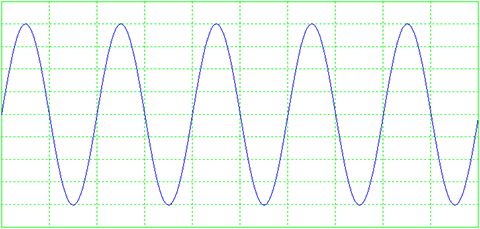
Sine wave
|
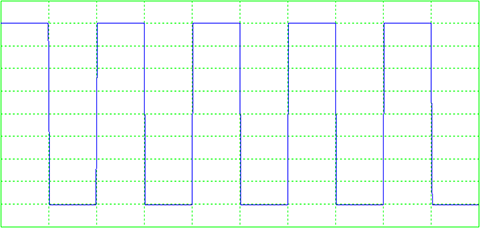
Square Wave (duty cycle adjustable)
|
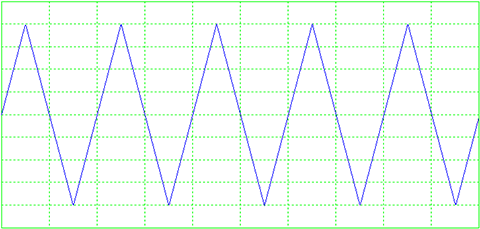
Triangle Wave
|
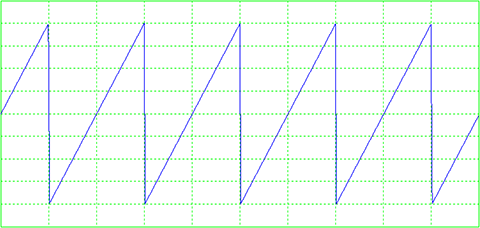
Saw Tooth Wave
|
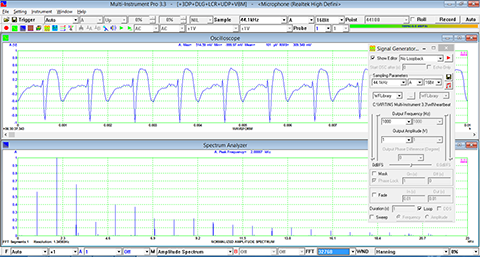
Arbitrary Wave
(user defined)
|
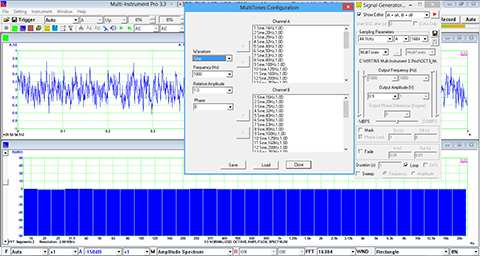
Multi-Tones
Stimulating 32 1/3 Octave Bands at Their Centerline
Frequencies
|
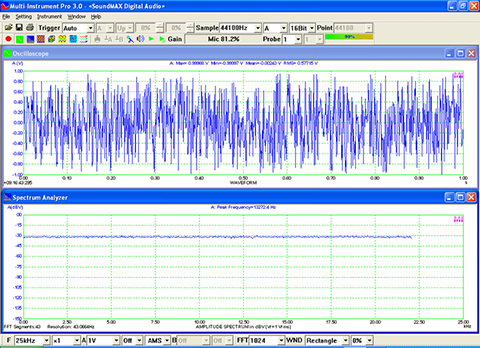
Narrow Band Spectrum Analysis of White Noise (flat)
|
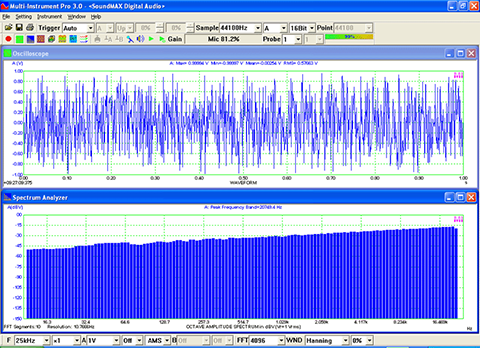
Octave Band Spectrum Analysis of White Noise (+3dB/octave)
|
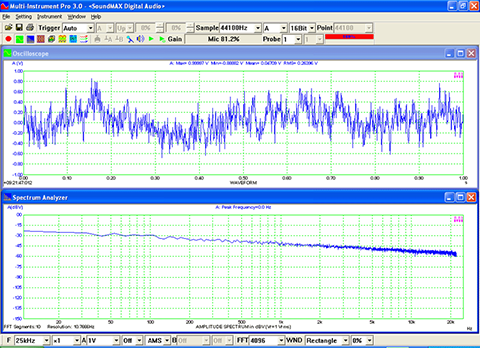
Narrow Band Spectrum Analysis of Pink Noise (-3dB/octave)
|
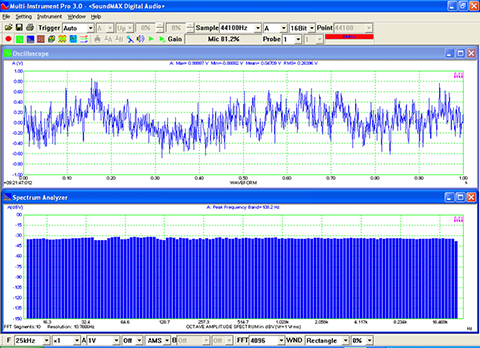
Octave Band Spectrum Analysis of Pink Noise (flat)
|
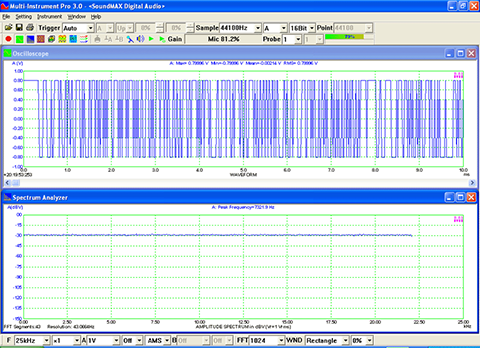 Narrow
Band
Spectrum Analysis of MLS (flat) Narrow
Band
Spectrum Analysis of MLS (flat)
|
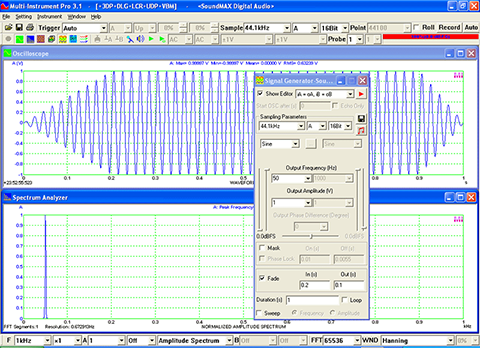
Signal Fade In and Out
|
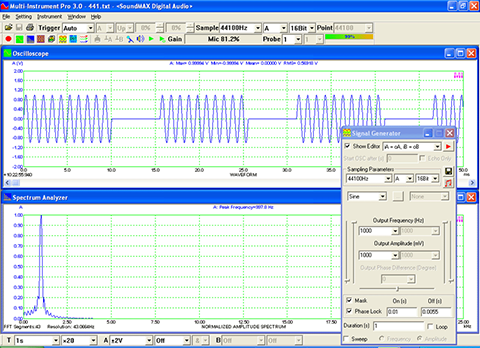
Burst Signal (gated by Rectangle window)
|
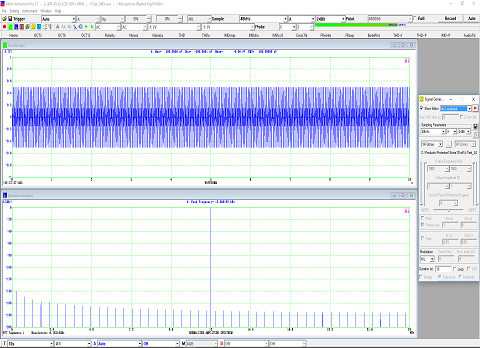
J-TEST Signal for AES3 Jitter
Test
|
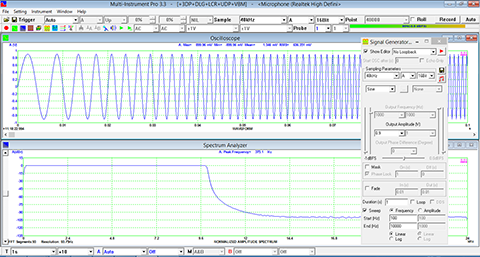
Frequeny Sweep (linear) with Narrow Band FFT
|
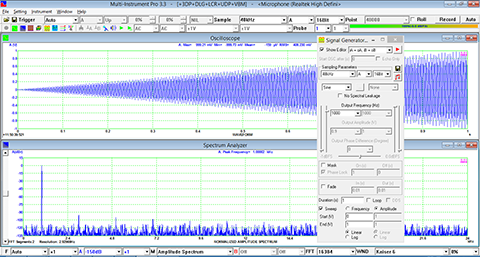
Amplitude Sweep (linear)
|
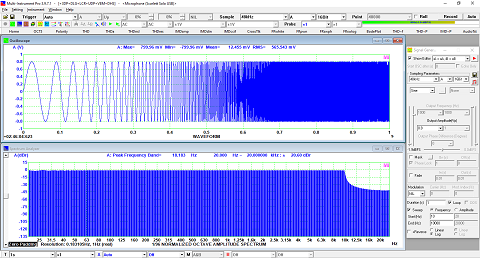
Frequeny Sweep (logarithmic) with Octave Analysis
|
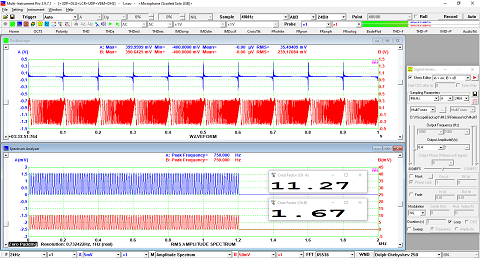
Multitone Phase Optimization to Minimize Crest Factor (Before:
blue, After: red)
|
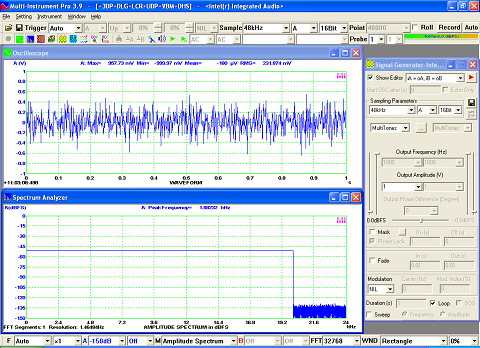
Multitone Periodic White Noise within Specified Frequency Range
(Narrow Band FFT)
|
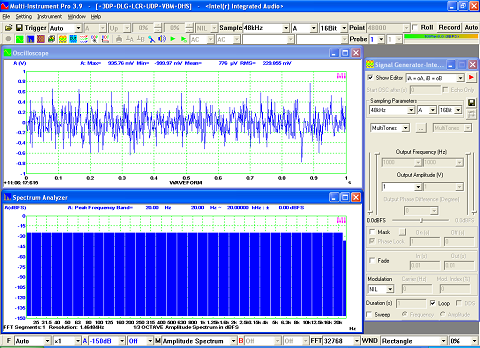
Multitone Periodic Pink Noise within Specified Frequency Range
(Octave Analysis)
|
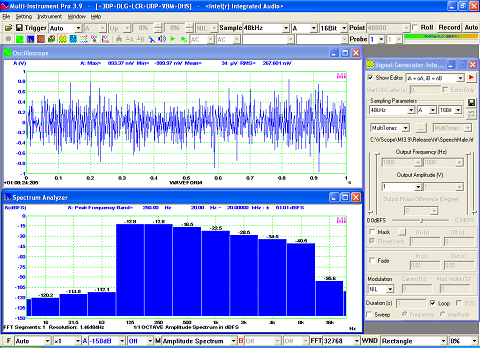
Multitone with Aribrary Spectrum
(Male Speech as defined in IEC 60286-16)
|
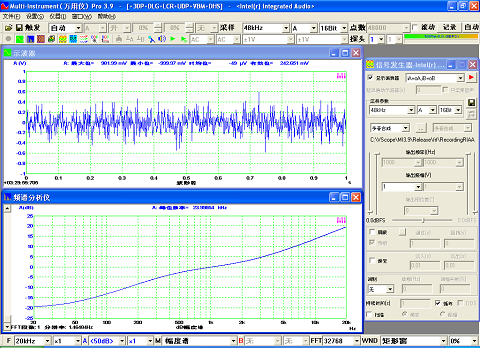
Multitone with Arbitrary Spectrum (RIAA Recording Response)
|
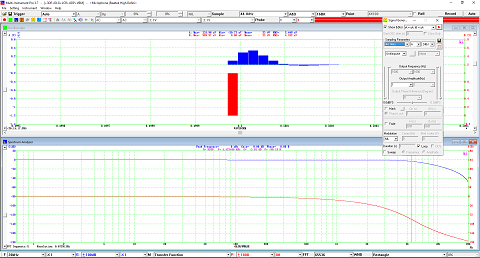
Digital Filter Impulse Response & Bode Plot Measurement using
Unit Impulse Signal
|
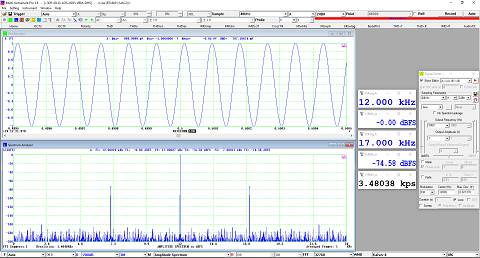
Jitter Measurement using J-TEST Signal
|
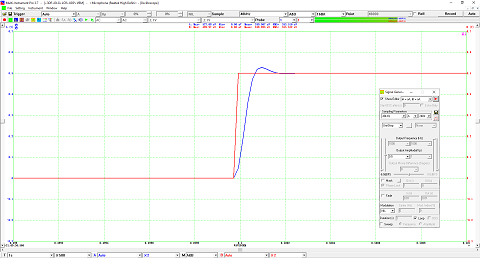
Digital Filter Step Response Measurement using
Unit Step Signal
|
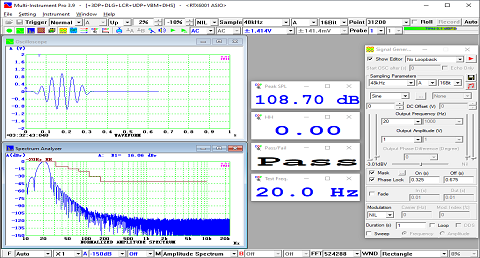
ANSI / CEA-2010 Subwoofer Peak SPL Test using a 6.5-cycle Hann
Windowed Sine Burst
|
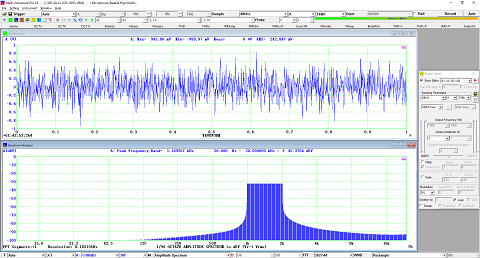
Multitone Periodic Band Limited Pink Noise under Octave Analysis
|
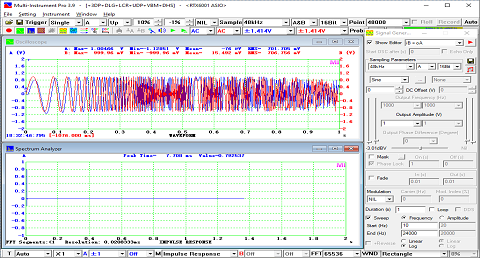
Impulse Response Measured with Single Field Input under Partial
Loopback Mode (iB=oA)
|
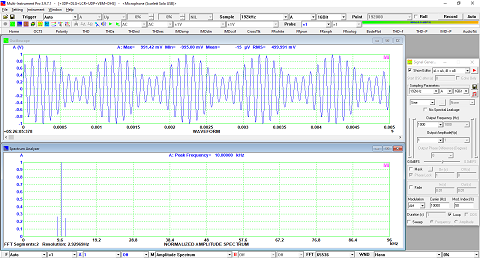
Generation of a Amplitude Modulation Signal
|
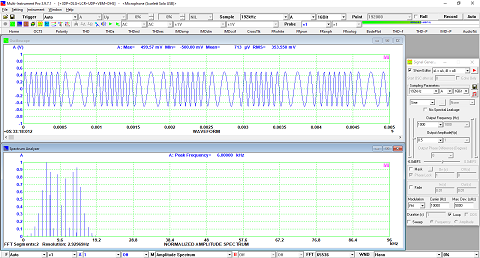
Generation of a Frequency Modulation Signal
|
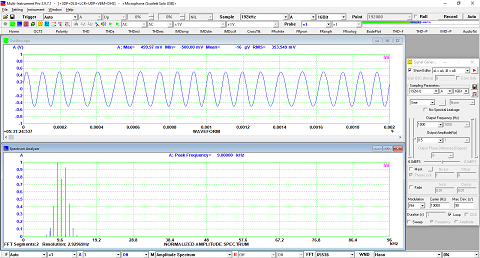
Generation of a Phase Modulation Signal
|
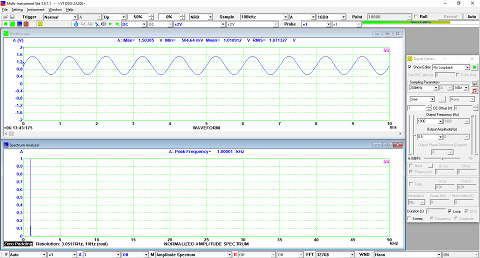
Generation of a Periodic Signal with a DC offset
|
|